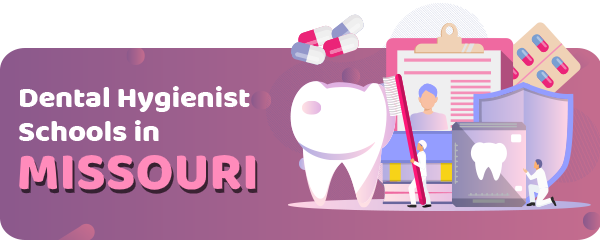In Missouri, the dental hygiene field is a growing one, which makes it a good choice for a new career.
Before being able to practice, you need to get a dental hygiene license.
In this state, the certifications are managed by The Missouri Dental Board.
Article Table of Contents
Attending a Training Program
To get licensed, you will need an associate’s degree from a school that is accredited by the Commission on Dental Accreditation (CODA).
This requires at least 2 years of studying and is the minimum acceptable for a dental hygiene license.
However, you may want to look into a bachelor’s degree or other forms of higher education to get a better job.
Most of the accredited schools offer varied higher education programs and also have certain criteria to meet before enrollment, such as having a CPR certification.
| School Name | Address |
|---|---|
| Hillyard Technical Center | 3434 Faraon St, Saint Joseph, Missouri 64506-5102 |
| Missouri Southern State University | 3950 E. Newman Road, Joplin, Missouri 64801-1595 |
| North Central Missouri College | 1301 Main St, Trenton, Missouri 64683 |
| Ozarks Technical Community College | 1001 E. Chestnut Expressway, Springfield, Missouri 65802 |
| State Fair Community College | 3201 W 16th Street, Sedalia, Missouri 65301-2199 |
| University of Missouri | 5100 Rockhill Rd, Kansas City, Missouri |
Passing The License Exam
Missouri requires candidates to pass 3 exams:
- The National Board exam
- The Regional exam
- The Jurisprudence exam.
The National Board Test
This test is managed by the American Dental Association (ADA) Joint Commission on National Dental Examinations.
To receive your application, you need to send in scores from the exam.
You can either take the exam by attending a CODA-accredited program first or a course that was not accredited.
In such a case, you also need to provide:
- Letter from the school’s dean
- Letter from the secretary of a Board of Dentistry
- Official Dental School transcripts
To apply for the exam, you need:
- Register for a Dental Personal Identifier Number (A DENTPIN)
- Apply for examination
- Submit $400 application fee
Regional Exam
In Missouri, this exam is available at various centers.
After taking the exam, submit the scores to the Board.
Jurisprudence Exam
This test comprises 50 questions on dental hygiene practices and is open book.
The test requires an 80% passing score.
Send in Your Application
To be able to apply, you need to submit:
- A filled-in form
- $155 fee
- Passport style photo
- Official school transcripts
- Official National Board Scores
- Competency Exam Scores
- Current CPR Certification
In order to get a new license with credentials, you need to submit proof of a 2-year-old license in another state.
Your current license will also be verified by the Missouri Dental Board.
Expected Salary
Those with a Bachelors’s or higher degree can expect to earn more than the average salary shown below for dental hygienists in Missouri.
Annual Salary Range:| Location | Avg. Annual Salary |
|---|---|
| Kansas City | $73,530 |
| St. Louis | $73,747 |
| Springfield | $72,304 |
| Columbia | $72,953 |
| Independence | $73,450 |
| Lee's Summit | $73,250 |
| O'Fallon | $73,148 |
| St. Joseph | $72,831 |
| St. Charles | $73,348 |
| St. Peters | $73,187 |
Regional Salary in Missouri
| Region | Employed | Avg. Annual Salary | Avg. Hourly Pay | Top 10% Annual Salary | Bottom 10% Annual Salary |
|---|---|---|---|---|---|
| Cape Girardeau, MO-IL | 70 | $75,870 | $36.48 | $79,200 | $67,090 |
| Columbia, MO | 120 | $79,270 | $38.11 | $91,070 | $60,980 |
| Jefferson City, MO | 80 | $73,460 | $35.32 | $89,930 | $59,840 |
| Joplin, MO | 90 | $75,680 | $36.39 | $89,930 | $67,810 |
| Kansas City, MO-KS | 1,550 | $81,660 | $39.26 | $93,570 | $65,450 |
| St. Joseph, MO-KS | 60 | $78,890 | $37.93 | $91,790 | $71,470 |
| St. Louis, MO-IL | 1,990 | $80,060 | $38.49 | $93,600 | $63,420 |
| Springfield, MO | 270 | $77,480 | $37.25 | $87,980 | $66,440 |
* Employment conditions in your area may vary.
Renewing Your Certification
Your certification has to be renewed after 2 years, for which you have to take 30 extra class hours.
Out of the 30 hours, 25 must cover theory.
You will need to get a separate training and certification if you plan on working with nitrous oxide.
Read the full guide: How to Become a Dental Hygienist
